
12 Types of Healthcare Software
The healthcare industry is evolving at an unprecedented pace, driven by advancements in technology and the pressing need for efficient, patient-centric care.
In the past few years, medical software solutions have become the backbone of healthcare, offering a myriad of tools to enhance patient care, streamline administrative tasks, and empower healthcare professionals.
In this article, we delve into the diverse world of healthcare software, highlighting 12 key types that are reshaping the way healthcare is delivered and experienced. No matter if you are a healthcare executive looking for the most innovative software solutions for your business or just an enthusiast of digital technology, this article is a must-read for you!
Contents
- Digital transformation in healthcare industry
- 12 Types of healthcare software solutions
- Electronic Health Records (EHR) Software
- Hospital Management Software
- Healthcare CRM Software
- Medical Database Software/a>
- Medical Diagnosis Software
- Medical Imaging Software
- Remote Patient Monitoring (RPM) Software
- Telemedicine Software
- Appointment Booking Software
- Health Tracking Software Applications
- E-prescribing Software
- Healthcare Billing Software
Digital transformation in healthcare industry
What are medical software solutions?
A healthcare software solution is a specialized computer program, application, or system designed to address specific needs within the healthcare and medical field.
These solutions encompass a wide range of software applications that support various aspects of healthcare, including clinical care, administrative tasks, patient management, data analysis, and more.
Medical software solutions aim to enhance the quality of patient care, improve operational efficiency, streamline processes, and facilitate data-driven decision-making within healthcare organizations and medical practices.
The role of software in healthcare
The role of custom software in the healthcare industry cannot be overstated.
Just like travel, finance, and e-commerce markets are undergoing rapid digital transformation, the healthcare sector is quickly changing as well all thanks to modern medical software solutions.
According to the latest data, the global medical software as a service market size was valued at USD 12.5 billion in 2020 and is expected to expand at a compound annual growth rate (CAGR) of 19.5% from 2021 to 2028. The global healthcare IT market size was valued at USD 167.7 billion in 2022 and is projected to grow at a CAGR of 17.9% from 2023 to 2030.
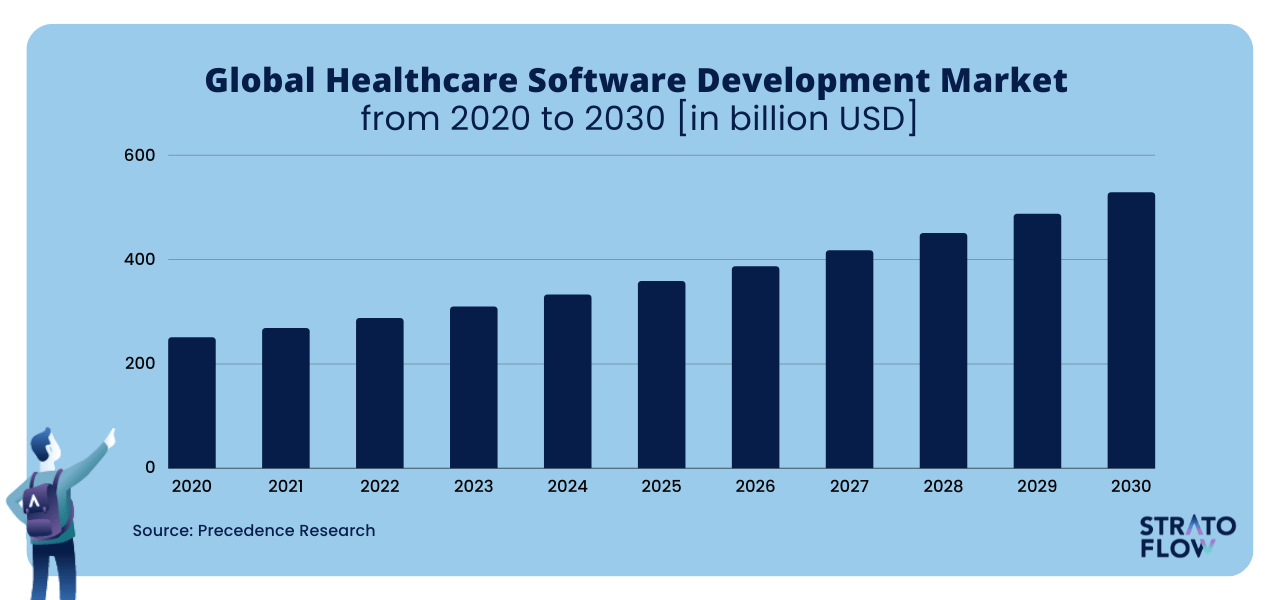
Spending on digital transformation among healthcare providers has surpassed $1.3 trillion globally and is growing by 10.4% yearly. A study published by Deloitte shows that as many as 92% of medical professionals and medical facilities have achieved productivity gains just through digital transformation.
The percentage of physicians who feel digital health tools are an advantage for patient care grew from 85% in 2016 to 93% in 2022.
[Read also: Application Development Guide: Types of Applications and Development Methodologies]
12 Types of healthcare software solutions
From Electronic Health Records (EHRs) and medical research software to Telemedicine platforms and Health Tracking apps and beyond, different types of medical software are not only shaping the present but also charting the course for the future of healthcare.
Let’s now cover twelve of the most important ones, and see their advantages and potential applications.
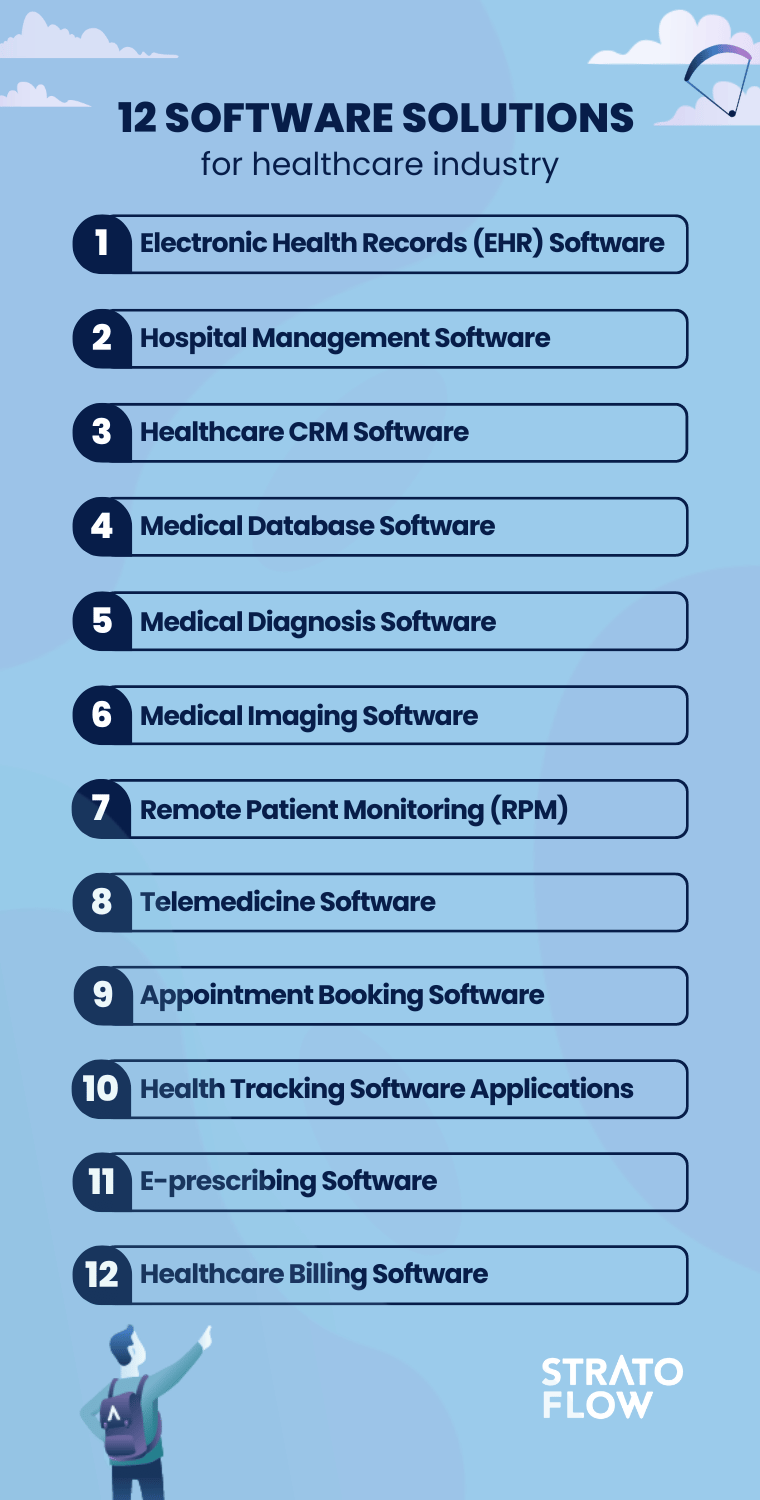
Electronic Health Records (EHR) Software
First on our list is the Electronic Health Records (EHR) Software which is a digital system designed to store, retrieve, manage, and collect patient data and health information.
EHRs have revolutionized the way healthcare information is handled, moving from paper-based records to comprehensive electronic databases. They are a critical component of modern healthcare management and play a pivotal role in improving patient care, streamlining administrative processes, and enhancing the overall efficiency of healthcare organizations.
EHR software serves as a central repository for patient health and medical records, including medical history, treatment plans, lab results, medications, allergies, and other patient data. They allow authorized healthcare professionals to access and update patient information securely, ensuring that accurate and up-to-date data is available when needed. EHR software operates on secure servers or cloud-based platforms, ensuring data integrity and accessibility.
The two most popular types of EHR software are:
- Electronic patient record software (EPR) – These tools are used internally by hospitals to store and process patient information.
- Electronic medical record software (EMR) – These types of tools are used to store data like medication types and dosages, planned procedures, and data on the patient’s entire recovery course.
Examples
Hospital Management Software
Hospital Management Software (HMS), also known as Hospital Information System (HIS) or Healthcare Management System, is a specialized medical software solution designed to streamline and automate various administrative, financial, and clinical processes within a healthcare facility, primarily hospitals.
The main purpose of HMS is to enhance the overall efficiency, effectiveness, medical equipment management, and quality of healthcare services while improving patient care and reducing administrative burdens.
Hospital Management Software often integrates with several other systems to ensure seamless operation and data exchange like Laboratory Information Systems (LIS), Radiology Information Systems (RIS), Pharmacy Systems, Electronic Health Records (EHR), and Financial and Accounting Systems.
Examples
Healthcare CRM Software
Healthcare Customer Relationship Management (CRM) Software is a specialized software solution tailored to manage interactions and relationships between healthcare providers and patients.
Unlike Hospital Management Software (HMS) and Electronic Health Records (EHR) Software, which primarily focus on operational and clinical aspects, respectively, Healthcare CRM software centers on patient engagement, communication, and improving the overall patient experience.
Healthcare CRM enables personalized communication with patients through various channels, including email, SMS, and patient portals. CRM systems often include appointment scheduling features, allowing patients to book appointments online, reschedule, or cancel them conveniently. Thanks to their functionalities, CRM software helps healthcare providers personalize patient interactions, improve communication, and offer a seamless experience, ultimately increasing patient satisfaction and loyalty.
[Read also: What’s the Future of Digital Transformation and Its Trends in 2022? An Expert’s Point of View]
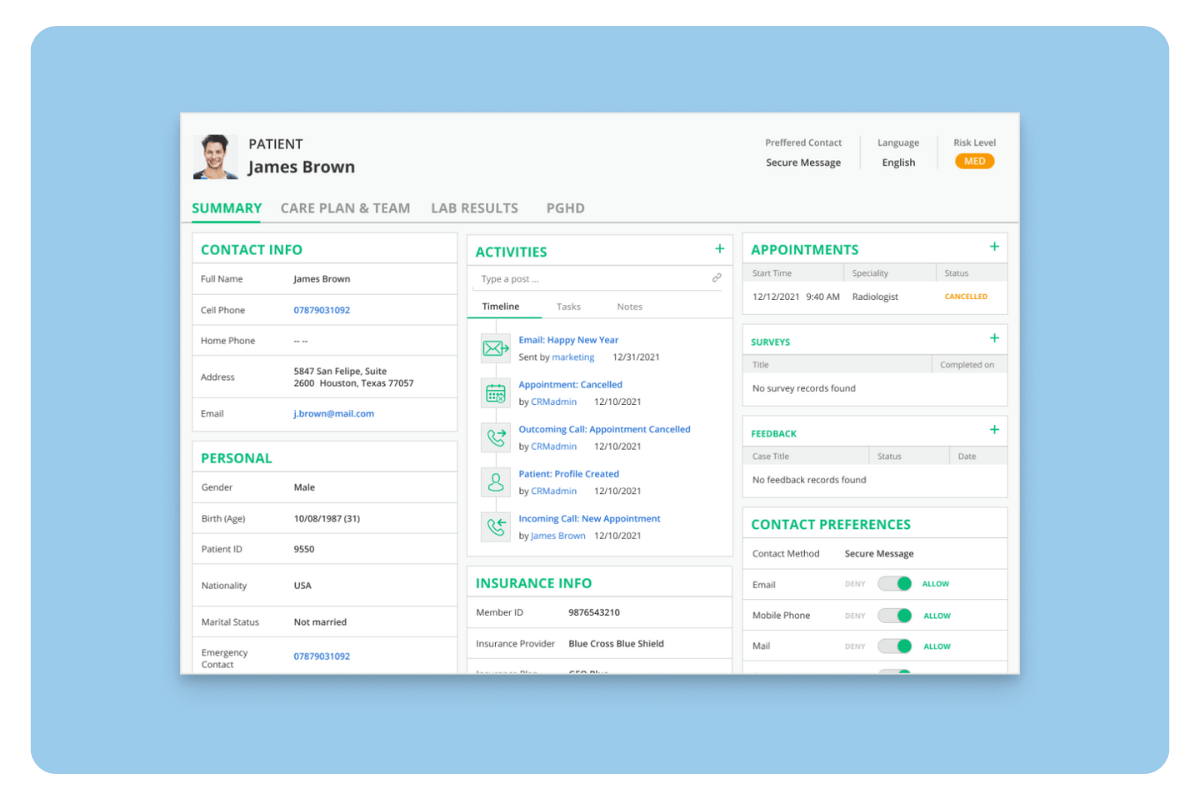
Source: ScienceSoft
Examples
Medical Database Software
Medical Database Software, sometimes referred to as Medical Practice Management Software or Medical Database Management Systems, is a specialized software solution designed to store and manage various types of medical and healthcare-related data.
While it shares some similarities with Electronic Health Record (EHR) Software, it serves different purposes and has distinct characteristics. Medical database software has a broader scope and is designed to store and manage a wide range of healthcare-related data beyond individual patient records. It is often used for administrative, operational, and analytical purposes.
It can store a variety of healthcare data, including patient records, billing and financial data, insurance information, scheduling and appointment details, inventory and supply management, and more. Medical database software streamlines administrative processes, reduces paperwork, and minimizes errors, improving the overall efficiency of healthcare organizations.
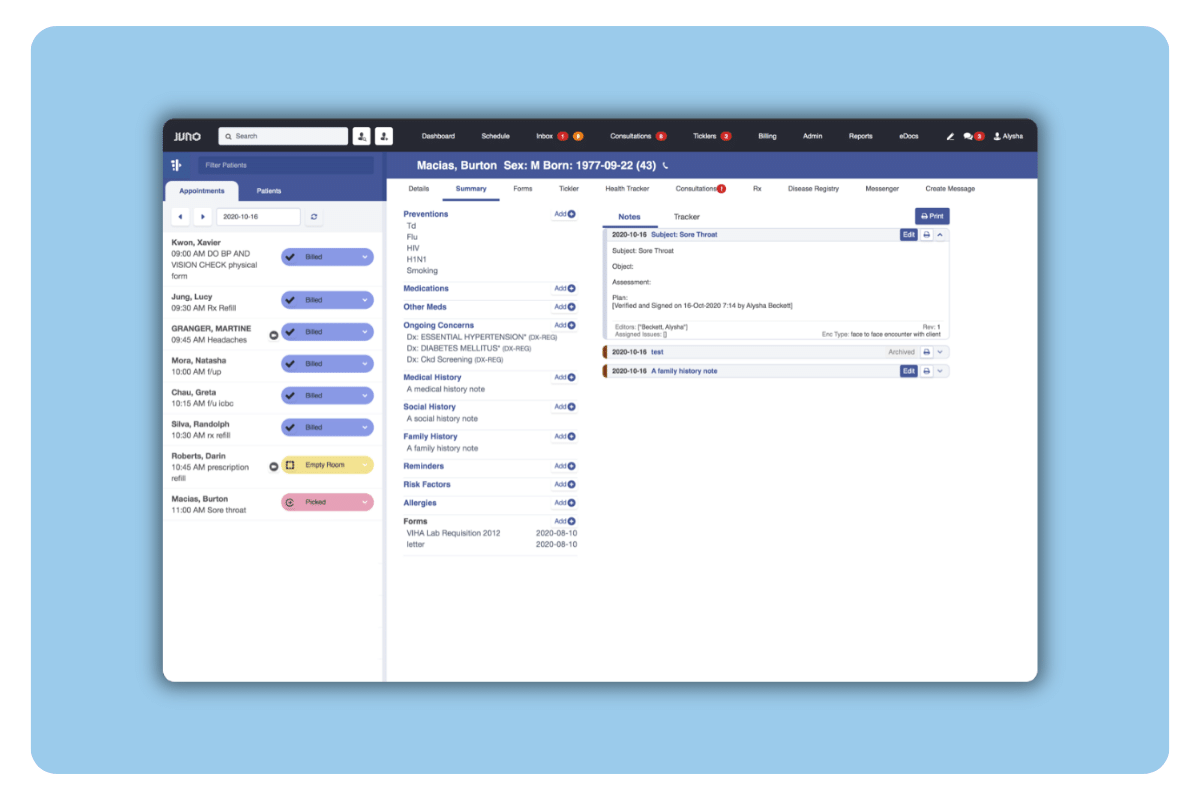
Source: Juno
Medical Diagnosis Software
Medical diagnosis software is a critical tool in the healthcare business, playing a pivotal role in improving the accuracy and efficiency of diagnosing diseases and medical conditions.
One possible application of Medical diagnosis software is their help in analyzing vast amounts of patient data, including medical histories, lab results, and imaging scans, with incredible speed and precision. This significantly reduces the risk of misdiagnosis and allows healthcare providers to make more accurate and timely diagnoses.
There are also medical diagnosis apps available for individuals. These are simplified versions of such software solutions that allow users to quickly check if their symptoms require a visit to the hospital. The popularity of diagnosis apps like these has risen significantly during the COVID-19 pandemic.
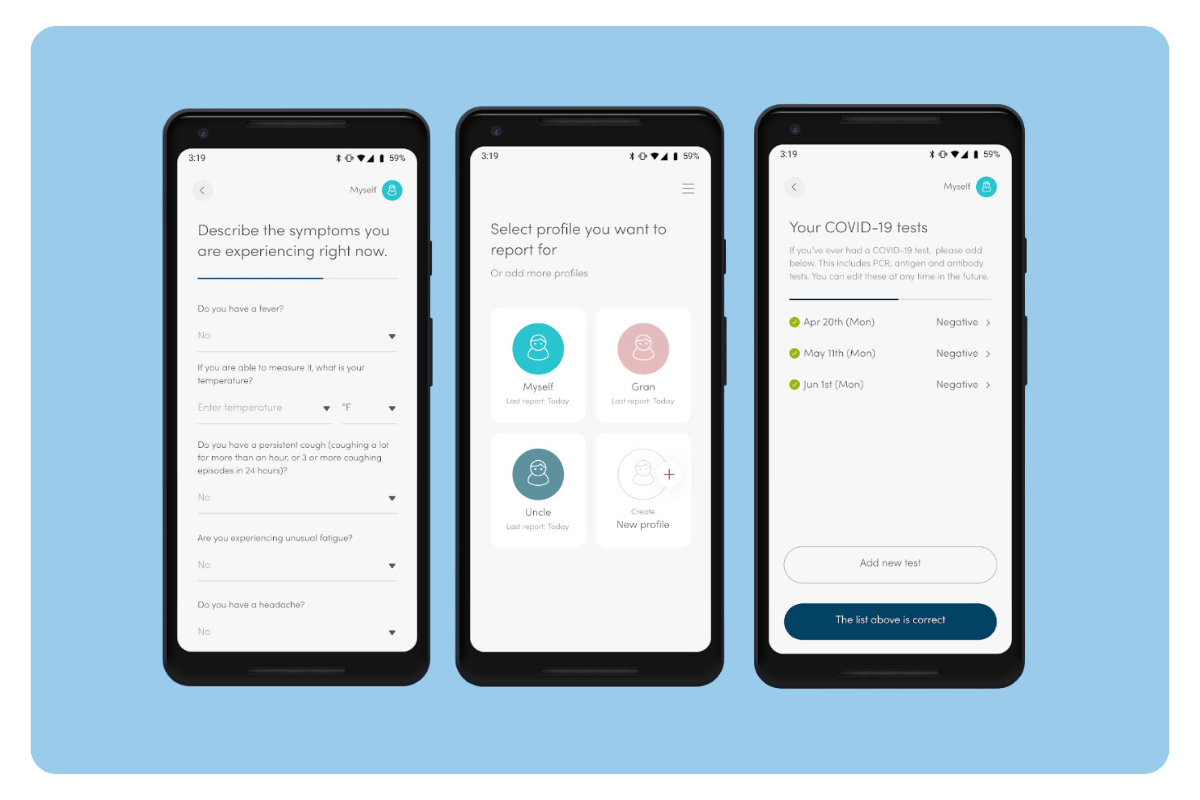
Source: Covid Symptom Tracker
Examples
Medical Imaging Software
Medical imaging software is a specialized technology used primarily for the visualization, analysis, and interpretation of medical images.
These images can include X-rays, CT scans, MRIs, ultrasound images, and various other diagnostic images. Medical imagining software is a cornerstone of modern healthcare, enabling healthcare professionals to obtain detailed insights into patients’ anatomy, diseases, and conditions.
Its primary uses are diagnostic imaging, treatment planning, guidance during medical procedures, and research and education.
Examples
Remote Patient Monitoring (RPM) Software
Remote Patient Monitoring Software (RPM) is a healthcare technology solution that allows healthcare providers to monitor patients’ health remotely, outside traditional clinical settings. RPM has gained significant importance in recent years, especially with the advancement of digital health technologies.
RPM enables continuous tracking of a patient’s vital signs, symptoms, and health metrics. This real-time data allows healthcare providers to detect issues early and provide timely interventions. Patients can also actively participate in managing their health, as Remote Patient Monitoring Software encourages self-monitoring and adherence to treatment plans. This engagement can in turn lead to better health outcomes. Also, by monitoring patients remotely, healthcare providers can intervene proactively to prevent complications, potentially reducing the need for hospital admissions and readmissions.
Examples
Telemedicine Software
Telemedicine software is a rapidly growing technology that facilitates remote medical consultations, diagnosis, and treatment between healthcare providers and patients through digital communication platforms.
This innovative approach to healthcare delivery has gained immense popularity in recent years, driven by advancements in technology and the need for accessible and convenient healthcare services, especially in the face of the COVID-19 pandemic. The telemedicine industry is projected to reach $64 billion merket value by the year 2025 just in the United States alone.
The biggest advantage of telemedicine is the fact that it eliminates the need for patients to travel to healthcare facilities, reducing the burden of commuting, wait times, and scheduling conflicts. Patients can access medical care from the comfort of their homes or workplaces.
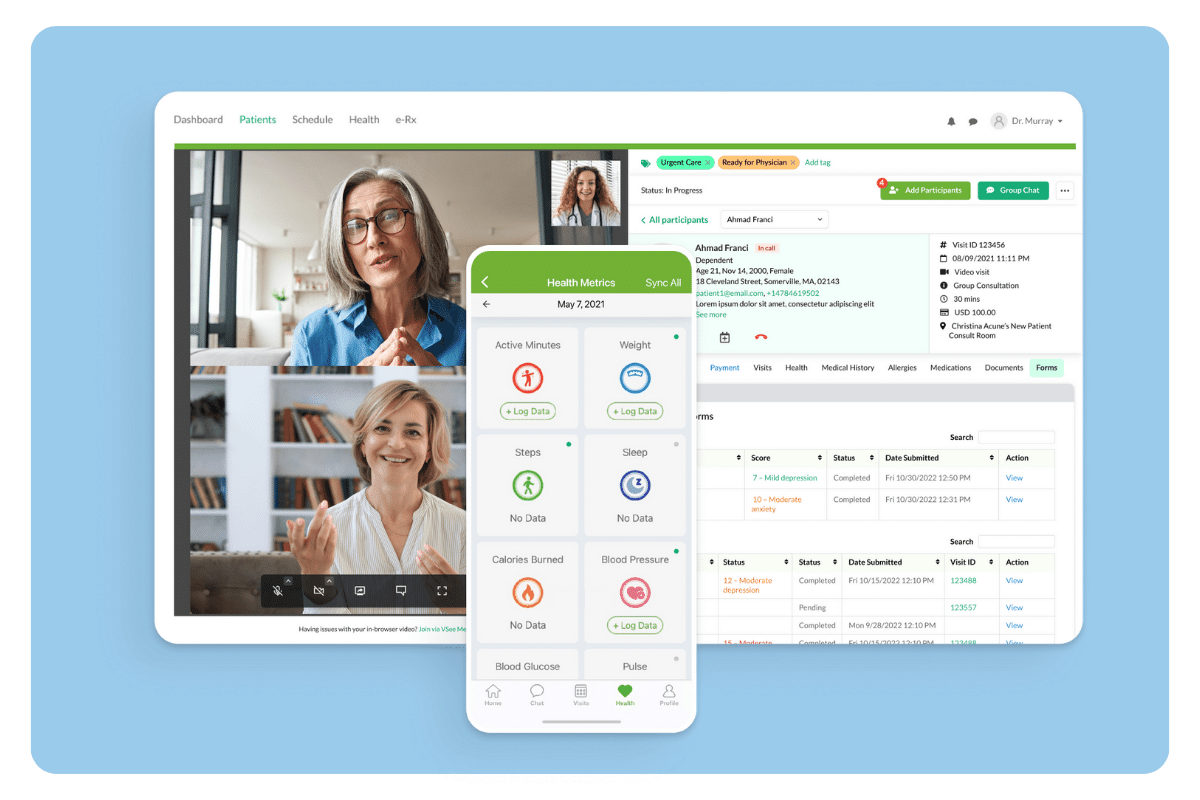
Source: Vsee
Examples
Appointment Booking Software
Appointment Booking Software, also known as Appointment Scheduling Software or Online Booking Software, is a digital tool designed to facilitate the scheduling and management of appointments and reservations in fields like travel, hospitality, and professional services.
Its main objective in the healthcare industry is fairly self-explanatory: to streamline the process of booking a doctor’s visit.
Appointment Booking Software plays a pivotal role in helping patients schedule appointments with doctors, specialists, and other healthcare providers. It ensures efficient utilization of medical resources and improves patient access to care. Some appointment booking software solutions integrate with Electronic Health Records (EHR) and compliance systems to ensure data security and regulatory compliance.
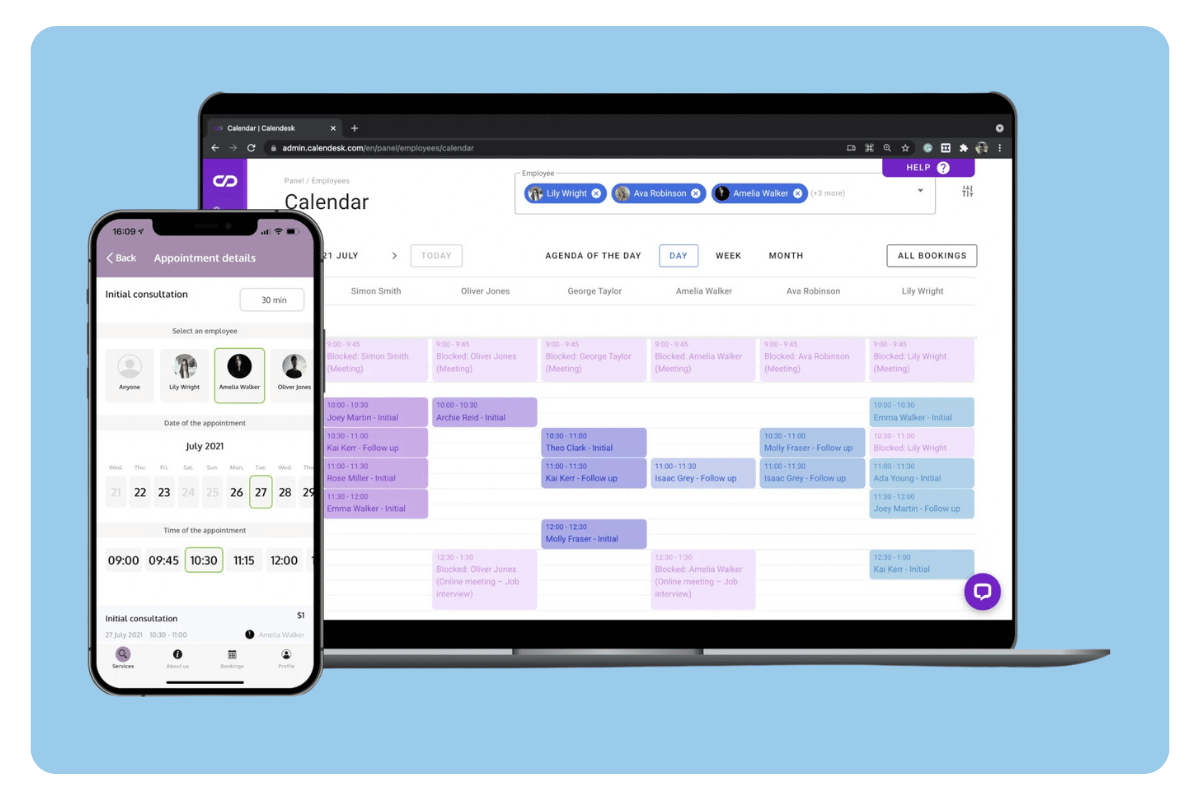
Source: Calendesk
Health Tracking Software Applications
Another key and ever-so-popular type of healthcare software are health tracking software applications, often referred to as mHealth (mobile health) applications are digital tools that enable individuals to monitor and manage various aspects of their health and well-being using smartphones and other mobile devices.
These applications have become increasingly important in modern healthcare, offering users a range of valuable functions to promote healthy living, monitor chronic conditions, and engage in preventive care. In 2019, the global mHealth app industry was valued at $37 billion.
Key subtypes of health tracking software include:
- Fitness and activity trackers – these apps help users monitor their physical activity, including steps taken, distance covered, calories burned, and sleep patterns.
- Nutrition and diet apps – These types of health-tracking apps assist users in tracking their food intake, calorie counts, macronutrient consumption, and meal planning.
- Mental health and wellness apps – These apps focus on mental well-being, offering stress management techniques, meditation sessions, mood tracking, and access to mental health professionals via telehealth.
- Medication management apps – This type helps users manage their medication regimens by providing medication reminders, tracking dosages, and offering pill identification features.
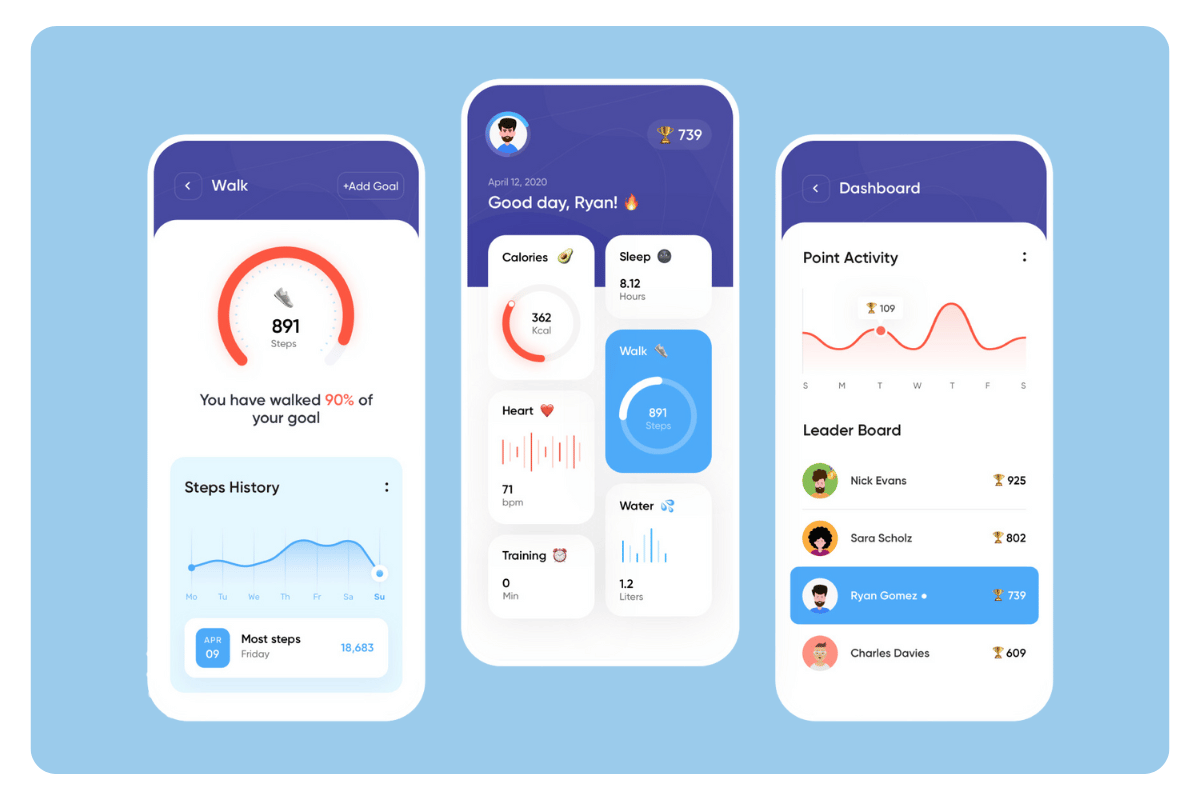
Examples
E-prescribing Software
E-prescribing software is a digital solution that healthcare providers use to create, transmit, and manage electronic prescriptions for medications. This technology has revolutionized the prescription process, offering numerous benefits in terms of safety, efficiency, and accuracy.
E-prescribing software allows healthcare providers to create digital prescriptions for medications, eliminating the need for paper prescriptions. It also performs real-time checks for potential drug interactions, allergies, and duplicate therapies, helping healthcare providers make informed decisions and prevent medication-related issues.
Healthcare Billing Software
Healthcare Billing Software, also known as Medical Billing Software, is a specialized digital solution used by healthcare providers, medical practices, and hospitals to manage the complex process of billing patients and insurance companies for medical services.
This software streamlines the revenue cycle management, ensuring accurate and efficient billing, reimbursement, and financial operations within the healthcare organization.
Healthcare billing software maintains comprehensive patient records, including demographic information, insurance details, and billing history. On top of that Healthcare Billing Software generates patient statements and invoices, detailing the services provided, charges, and payment due dates.
How do I find the right healthcare software?
Selecting the right healthcare software is a critical decision that can profoundly impact the efficiency, accuracy, and quality of care within a healthcare organization. In an era where technology plays an ever-expanding role in healthcare delivery, the choices can be overwhelming.
So, how do you find the right choice for your organization?
[Read also: Benefits of Open-Source Software for Developers, Managers and Business]
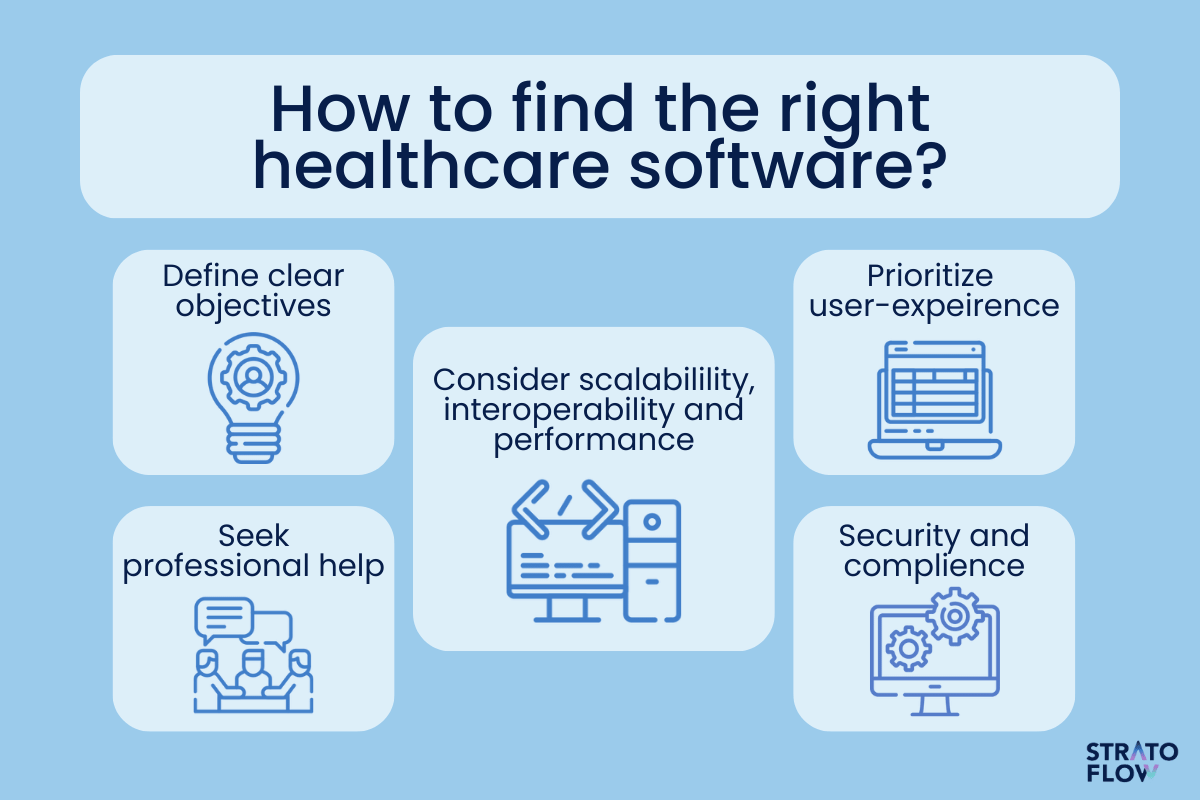
Define clear objectives
First and foremost, it’s essential to define your specific needs and objectives.
Different healthcare software solutions cater to various aspects of healthcare, whether it’s Electronic Health Records (EHR), Hospital Management, Telemedicine services, or specialized tools like Medical Billing or E-prescribing software. Understand the unique requirements of your organization, whether you’re a small medical practice, a large hospital, or a telehealth services.
Consider scalability, interoperability, and software performance
Healthcare software should grow with your organization and seamlessly integrate with existing systems, such as EHRs or lab systems.
The ability to share data across platforms is crucial for providing comprehensive patient care and optimizing workflows.
Prioritize security and compliance
Healthcare software must meet strict data security standards and comply with regulations like HIPAA to protect patient information.
Evaluate the software’s security features, encryption protocols, and audit capabilities to ensure robust data protection.
Polish your user experience
User-friendly interfaces and intuitive workflows are essential to ensure that healthcare professionals can easily adapt to and make the most of the software. Training requirements and ongoing support should also be considered.
Seek professional help
Finding the right healthcare software is not just about technological features; it’s about aligning technology with your organization’s goals and values. That’s why it often requires out of the box approach that can be accomplished only by custom software development.
Healthcare software development requires careful consideration of the client’s unique needs, scalability, security, and usability. All of these factors should guide the development team toward making an informed decision that ultimately benefits both your healthcare professionals and the patients they serve.
Conclusion
As we conclude our exploration of the main types of healthcare software, one thing becomes abundantly clear: technology is at the forefront of transforming the healthcare landscape.
From streamlining administrative tasks to speeding up patient’s recovery, these software solutions are revolutionizing how we access, deliver, and experience healthcare.
As we look ahead, it’s crucial to recognize that the synergy between healthcare and technology will continue to advance, bringing about even more innovative and impactful solutions.
Related Posts
Thank you for taking the time to read our blog post!